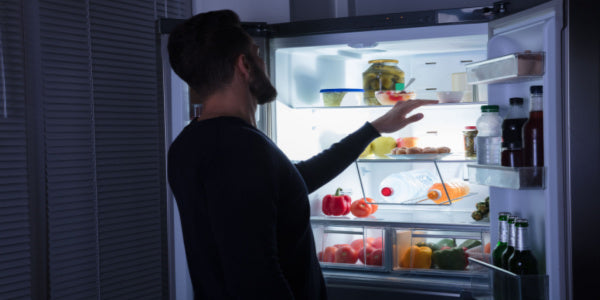
Late-night snacking after dinner and before going to bed can promote weight gain and may interfere with getting a sound night of sleep. But the link between late-night snacking and health is not necessarily the timing but more to do with what is chosen for a late-night snack.
Sweets, fried foods, packaged snacks, sugary cereal, and other high-calorie foods tend to be favored for late-night cravings. Rarely are fruits, vegetables, whole grains, and other nutrient-dense foods craved before bedtime!
Before wandering into the kitchen before bed, discover how to avoid unhealthy late-night snacks and what to choose instead for better sleep and overall health.
5 Ways to Avoid Unhealthy Late-Night Snacking
Turning to a late-night snack can be both a mental habit or from true hunger. It can take practice to mindfully change behaviors to shift away from turning to late-night snacks.
And, if hunger is really the cause, a late-night snack doesn’t have to derail weight loss or a good night’s rest. The following tips provide ways to avoid unhealthy midnight snacks and prevent disrupted sleep.
1. Occupy Your Evening
Nighttime is often a respite from work and daily tasks — a time to relax and kick back. But if after dinner, your idle hands often find their way to the refrigerator door and your nighttime snacking habits may threaten your weight loss goals.
Staying occupied and away from screens at night can help deter boredom eating or the feeling of a craving for a late-night snack.
Instead of relying on food for thought, occupy your thoughts and time with a good book, conversation, a hobby, or a vigorous walk in the park to stimulate your mind and your metabolism.
2. Turn to Healthy Late Night Snacks
You are what you eat, as the adage goes, so if your late-night snacking habit consists of chips, cookies, or soda, you're more likely to become overnight, lethargic, and ill-equipped for productivity the next day. This low energy feeling during the day can propel the cycle of turning to high-calorie foods at night.
The cycle of unhealthy late-night snacking at night needs to be broken and replaced with the best foods to eat at night to lose weight. Particularly, healthy snack options are balanced with lean protein, healthy fats, and high-fiber carbohydrates. For example, swap milk chocolate sweets for heart-healthy dark chocolate in small quantities or swap ice cream for Greek yogurt topped with raspberries.
Instead of potato chips or packaged snacks, grab a handful of nuts, roasted chickpeas, or edamame for a healthier but satisfying salty snack.
3. Fortify Your Dinner
One of the top reasons for unhealthy nighttime snacking is an unfilling dinner, mainly from empty calories like refined pasta or processed foods.
As these foods don't satiate you for long, a non-filling dinner makes you more likely to indulge in menacing munchies late at night. To curb nighttime snacking, fill your dinner plate with lean proteins, whole grains, and fresh, fibrous vegetables that will nourish your appetite and your body throughout the night.
Easy dinner ideas to keep blood sugars balanced and you feeling full all night long include sheet pan meals or nourish bowls.
4. Quench Your Thirst
It can be easy to mistake thirst for hunger and turn to a snack when your body really needs more water. Distinguishing hunger pangs from thirst is one of the best ways to learn how to avoid night time snacking.
When a craving hits you, don't be too quick to reach for the pantry. Instead, sip a spot of herbal tea, water, or homemade ginger tea before you settle into bed.
5. Don't Eat Behind Closed Doors
Eating in your bedroom may afford convenience and indulgence, but it can also lead to excessive grazing on empty calories and create a feeling of guilt surrounding nighttime snacking.
Snacking need not be a cloak-and-dagger habit that you hide from the world. Come out of the bedroom and enjoy a healthier bedtime snack at the dining table or in the kitchen surrounded by company who supports you in your good eating habits.
Take the guilt out of nighttime snacking with bistroMD. BistroMD's meal delivery service offers chef-prepared, physician-certified meals and guilt-free snacks that are designed to help you achieve your optimal weight and support your health goals.
In Conclusion: How to Avoid Nighttime Snacking
Turning to a late-night snack can often include foods high in sugar, fat, or void of nutritional value. Eating these foods close to bedtime can not only interfere with a healthy weight but also with restful sleep.
If you want a nighttime snack, make it a healthy option that is lighter, lower in sugar, and provides a source of protein. Also consider your body may be sending a signal it simply needs more water, not necessarily to eat something. So, try drinking water or unsweetened beverage in place of a late-night snack.
Eat a dinner that provides a mix of fiber, protein, and healthy fats to ensure you are feeling satisfied long after eating.
Fill your evenings doing things with your hands or occupying your mind so you don’t focus on boredom eating or mindlessly snacking while watching a screen.







